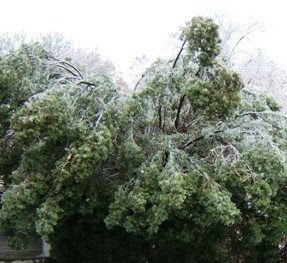


By Diane Silver
After almost eight hours without power, our electricity just came back on. To the anonymous utility repairperson who did this: Thank you so very much. You are my hero!
Meanwhile, the storm continues to ice my town of Lawrence, other Kansas locales, Missouri and the rest of the Midwest. The miracle of light and Internet access may or may not continue, so I'm getting this out while I can.
Before the lights went back on, I was sitting next to a candle. (I kid you not. I was hoping for a little heat and light as I scribbled with an ink pen onto good, old fashioned paper.) I was pulling my thoughts together for a new essay.
After a moment of concentration, though, I dropped the paying work and started a blog post (the pen-and-paper kind) about the ice storm. Focus didn't seem to be my strong point this morning, so here are a few chilly thoughts from earlier today.
No power. No heat. No TV. One working portable radio. We went from being a wireless house with 24-hour online access to no Internet at all because the router needs electricity to work. We can't cook (electric stove), can't microwave food, of course.
I'm wearing long pants, running shoes, a turtleneck, a thick cable-knit sweater, a fleece jacket and have a blanket on my lap and a pillow on top of that. The pillow is supposed to act as a laptop desk, but I'm hoping for more warmth, and yes, I'm still cold. I warm my fingertips on the candle.
I'm within sight of the digital thermostat -- a ridiculously 21st Century device in a 18th Century situation. The thermostat is methodically ticking downward, losing one degree an hour. We're at 58 degrees right now.
Outside my picture window, a FedEx truck speeds by, a mail truck rolls up and parks down the street -- all very 21st Century, but I'm wondering if another candle will provide more heat. My 80-year-old mother lives with me, and I keep trying to figure out when we should brave the ice to get her to a heated house.
Not to seem too dramatic, but this weird mix of 21st and 18th centuries makes me a tad uneasy.
And then the lights came on. I did a happy dance, turned on the computer, and here I am -- warm, bathed in yellow light and once again communing with the world.
PHOTOS: The view from my front porch, including a cedar tree that stood tall and straight before the ice got it.




2 comments:
According to the news, you're lucky that you only lost power for eight hours. Apparently some people in Oklahoma may end up in the cold for a week and a half!
The ice in the trees is pretty, though.
We've become more electricity-dependent, but I don't think the electric service has increased in reliability. In fact, it seems to me that here in Washington it's become less reliable -- there has been less attention to infrastructure. My company was shut down for several days a few years back when fires in underground lines shut down power to our neighborhood. (That outage also included exploding manhole covers, which was entertaining and fortunately didn't kill anybody.)
However, when the underground lines are well-maintained, they're much less vulnerable to natural disasters than the ones strung on poles. I also have friends in the Capitol Hill neighborhood who almost never lose power, even during hurricanes and ice storms, because their lines are underground (and apparently better maintained).
Natural disasters cause problems, of course, but poor infrastructure aggravates those problems. Between global warming, energy issues, and our current inattention to infrastructure, I fear we may see more problems like you've suffered even as we increase our dependence on electricity.
I lived in this house for 23 years now, and have only experienced two sustained power blackouts. One was last March when a microburst hit my neighborhood and caused millions in damage to the city. The second one was this week. I lived here through tornadoes and countless severe thunderstorms.
What I suspect is happening is a potentially dangerous combination of rougher weather, increased population straining our capacity and a let's-drown-government mentality that is letting our infrastructure deteriorate.
Post a Comment